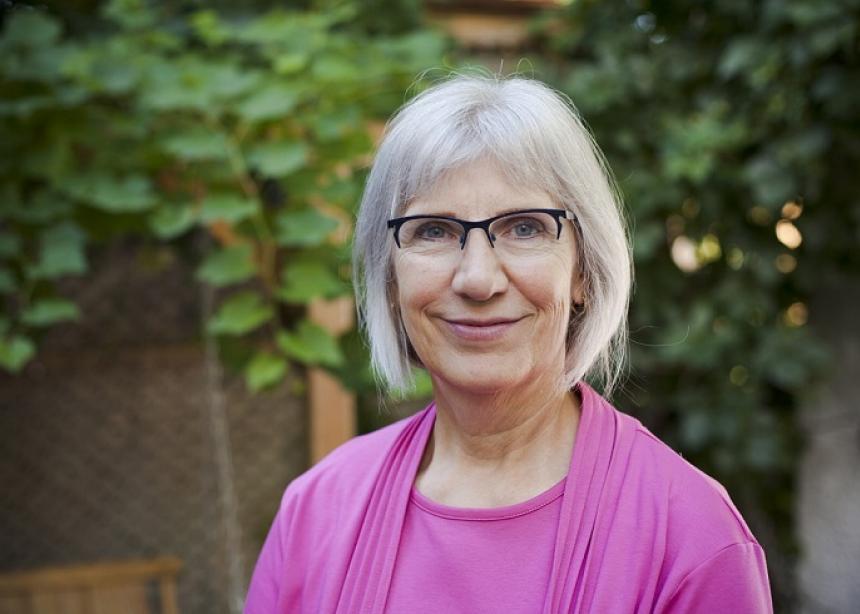Are you finding yourself divided from loved ones in your family, church or neighbourhood on any number of challenging issues? Are you finding fewer opportunities to talk with others across differences? Are the chasms leading to heightened stress and fractured relationships? Do you wonder if this is the best we can do in our families and churches?
I certainly am troubled by the increasing polarization, especially as hot topics and mean-spirited politics rend the body of Christ.
With these questions and this column, I hope to encourage us in the task of courageous listening and speaking. I recognize discomfort comes with such difficult topics and sometimes wish they would just disappear. That is not going to happen, and so we need to find firm ground on which to stand and the means to connect with each other in the midst of the complexities. Borrowing language from Mennonite Church Canada’s Being a Faithful Church process, I urge us to “strengthen our discernment muscles,” and our capacity for deep listening. To do so, I polled a few people with the question, “How do we talk about our deep differences?” Some of their responses shaped what follows.
First of all, the phrase “talk about” may be miscommunication. “Can we talk about this?” may actually mean “I want to speak at you until you acknowledge the validity of my perspective.” To couch it as talking together masks a more likely outcome, that we will talk past each other, wielding our wordy swords until the other is sliced into submission.
To talk together is to commit to listening, to be as willing to take in the other’s thoughts and feelings as to speak one’s own. There are obstacles to such a commitment. Deep listening requires laying aside my perspective, at least temporarily, to take in fully the words and meaning from the other person. When difficult topics are under discussion, such receptivity can be nigh impossible. Anger and fear insert static into the communication. Naming one’s powerful feelings, at least to oneself, reduces the static and makes it more possible to listen.
Deep listening also takes time, which we may be reluctant to invest in, for any number of reasons. It’s easier and more satisfying to talk to those with whom we agree. It’s stressful to talk across the divides, especially when the other person thinks and says such infuriating things. It can elicit our undesirable characteristics—like being aggressive or judgmental—that we prefer to avoid. It strains relationships, sometimes to the point of breaking. Maybe it’s better to avoid raising the hot topics than to risk a complete rupture.
To offer deep listening, we centre ourselves in our deep values. I believe that God’s Spirit resides in each human being, and that I am committed to seek and honour that God-spark. Such a commitment leads me to invest in relationships.
Of course, not all relationships benefit from, or require, the same level of engagement. But when we care passionately about an issue, we are compelled to engage with others who care, even if their views are opposite to ours. Our mutual care binds us in relationship.
Tending the relationship means that sometimes we focus on the relationship, not on the issue. Maybe we share coffee together. Maybe we talk hobbies or sports, pop culture or families. Maybe, in the body of Christ, we talk faith and offer to pray for each other. The “better angels of our nature,” a phrase from Abraham Lincoln, may guide our intentions and actions.
In future columns, I intend to write about some of these difficult topics. I invite you to join in the conversation.
Melissa Miller (familyties@mymts.net) has a passion for helping people develop healthy, vibrant relationships with God, self and others.
See other columns in Melissa Miller’s series on difficult conversations:
Can we talk about MAID?
Can we talk about death?
Can we talk politics?





Comments
I don't know if we can talk....?
When I hear those words, it seems that instead of an invitation to listening and learning, 'talk' is a code word for --opposition. And anyone opposing the accepted mantras of the day are listened to, into exhaustion. At MCC Canada we used call it the velvet stop. As in, 'Akron is doing the velvet stop' and everyone at coffee knew that things would go a certain way.
So can we talk? I think we can. Steve Heinrichs and I have proven that. But will we talk? I don't know. Right now the suspicion is that the Canadian Mennonite and MC Canada wants to manage the communication. And that has fostered a bucket of mistrust. A bucket and then some....
How will that trust be regained so communication can begin anew? Will the Canadian Mennonite allow alternate opinions to be shared in full on these pages?
Add new comment
Canadian Mennonite invites comments and encourages constructive discussion about our content. Actual full names (first and last) are required. Comments are moderated and may be edited. They will not appear online until approved and will be posted during business hours. Some comments may be reproduced in print.